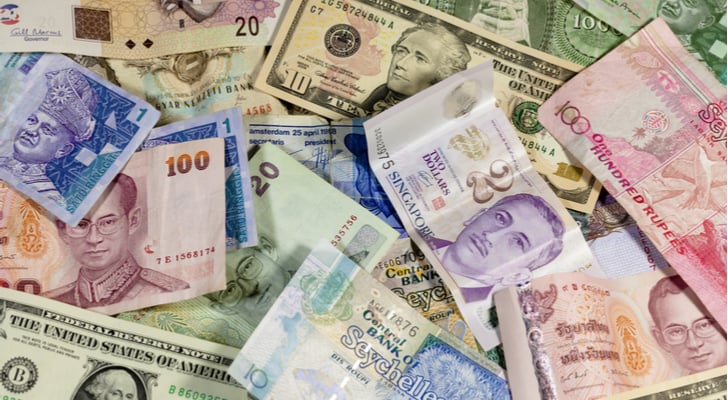There was some easing in the trade tensions between the U.S. and Mexico this week. Obviously, a new deal with Mexico to replace NAFTA will now have to be navigated through Congress and, while the outlook for that is uncertain, progress is still progress.
If a trade deal with Canada (and later with China) starts to look more likely in the short term, investor sentiment will continue to improve. A secondary effect of this progress is that the U.S. dollar is likely to weaken from its current highs.
For those of you who don’t have a lot of experience with the currency market, from an exchange rate perspective, a “weaker” dollar isn’t a bad dollar.
A weaker dollar boosts corporate profits (foreign income is translated at a more favorable rate) and tends to help exporters. And a secondary effect of a weaker dollar is stronger emerging market currencies, which is an important issue right now.
Instability in emerging market currencies — including an International Monetary Fund (IMF) bailout for Argentina, political instability in Brazil and a developing economic crisis in Turkey — is weighing on global markets. None of those economies are likely to have an impact on the U.S. individually, but economic contagion spreading to more than one would be more disruptive.
We have compared the U.S. Dollar Index (top) with the Russian Ruble, Argentine Peso, Brazilian Real and Turkish Lira (bottom) in the following chart. Earlier this year, when the dollar was falling, most emerging market currencies weren’t rising, which indicated some inherent weakness. As the dollar started to rise in April, emerging market currencies went into a severe decline. Unfortunately, that decline hasn’t paused yet, which could become a bigger problem if trade deals don’t ease the pressure.

U.S. Dollar Index (Top), Russian Ruble, Argentine Peso, Brazilian Real and Turkish Lira (Bottom)
The Argentine government has asked the IMF to accelerate another $50 billion credit line today. Argentina is South America’s second-largest economy, so a lack of confidence in the currency could quickly worsen problems in Brazil — the largest Latin American economy. Aid from the IMF could help restore some confidence in Argentina’s government, or it may just reveal the severity of the country’s problems.
In the past, currency disruptions in emerging markets have led to declines in emerging market stocks, which frequently precede corrections in U.S. stocks. As you can see in the following chart, declines in emerging markets — represented by the iShares Emerging Markets ETF (NYSEARCA:EEM) — preceded both large corrections in the S&P 500 in 2015. Traders have so far been willing to brush off currency, emerging market and yield curve warnings, but the risk of another correction increases as the S&P 500 rises to new highs.

S&P 500 (Top) versus iShares Emerging Markets ETF [EEM] (Bottom)
The Bottom Line
Risk is elevated, but the market is still bullish, so our bias remains cautiously optimistic in the near term. However, while the turmoil in emerging markets continues, we want to focus on prior trends and somewhat hedged trades. There is enough premium in the options market to pay an above-average return on put- and call-selling strategies. We plan to continue taking advantage of those opportunities along with our long options trades.
You can learn more about identifying price patterns and using them to project how far you think a stock is going to move in our Advanced Technical Analysis Program.
InvestorPlace advisers John Jagerson and S. Wade Hansen, both Chartered Market Technician (CMT) designees, are co-founders of LearningMarkets.com, as well as the co-editors of SlingShot Trader, a trading service designed to help you make options profits by trading the news. Get in on the next SlingShot Trader trade and get 1 free month today by clicking here.
